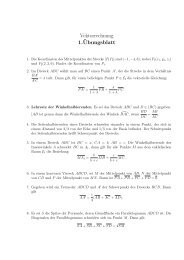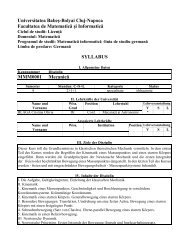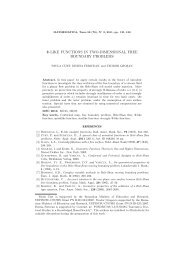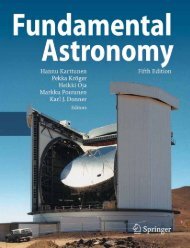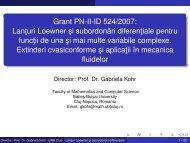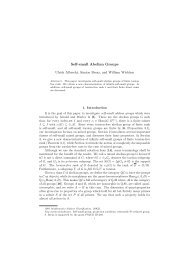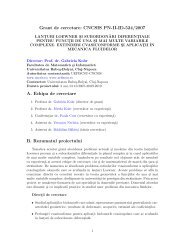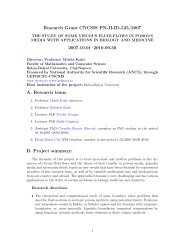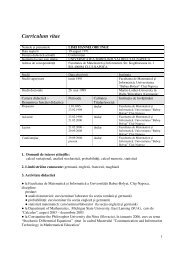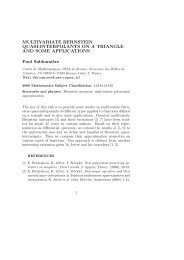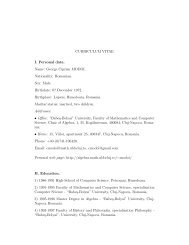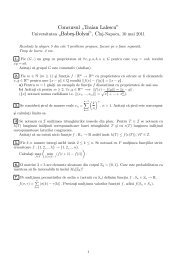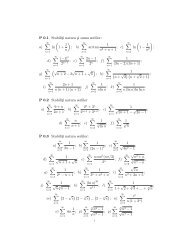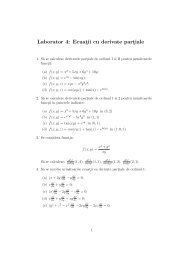- Page 2: Introduction to Planetary Science
- Page 6: A C.I.P. Catalogue record for this
- Page 10: Table of Contents Preface xvii 1. T
- Page 14: table of contents ix 7.3.4. The Ear
- Page 18: table of contents xi 12.1.2. Physic
- Page 22: table of contents xiii 15.6. Scienc
- Page 26: table of contents xv 22.8. Summary
- Page 30: Preface This textbook is intended t
- Page 34: preface xix structure, their geolog
- Page 38: On May 25, 1961, President John F.
- Page 44: 4 chapter 1 the coast of New Zealan
- Page 48: 6 chapter 1 Figure 1.3. Robert H. G
- Page 52: 8 chapter 1 engine. Therefore, spac
- Page 56: 10 chapter 1 and France included sc
- Page 60: 12 chapter 1 Kosmodemyansky AA (195
- Page 64: 14 chapter 2 Figure 2.1. The conste
- Page 68: 16 chapter 2 Figure 2.2. Galileo Ga
- Page 72: 18 chapter 2 The units of velocity
- Page 76: 20 chapter 2 Research, Reviews of G
- Page 80: The solar system is dominated in al
- Page 84: the planets of the solar system 25
- Page 88: the planets of the solar system 27
- Page 92:
the planets of the solar system 29
- Page 96:
the planets of the solar system 31
- Page 100:
the planets of the solar system 33
- Page 104:
An acceptable theory of the origin
- Page 108:
life and death of stars 37 Figure 4
- Page 112:
life and death of stars 39 Table 4.
- Page 116:
life and death of stars 41 for an a
- Page 120:
life and death of stars 43 Figure 4
- Page 124:
life and death of stars 45 27 thous
- Page 128:
life and death of stars 47 The expa
- Page 132:
The Milky Way galaxy contains cloud
- Page 136:
origin of the solar system 51 and t
- Page 140:
origin of the solar system 53 theor
- Page 144:
origin of the solar system 55 Figur
- Page 148:
origin of the solar system 57 emiss
- Page 152:
origin of the solar system 59 Figur
- Page 156:
origin of the solar system 61 drama
- Page 160:
origin of the solar system 63 3. Th
- Page 164:
66 chapter 6 Figure 6.1. This pictu
- Page 168:
68 chapter 6 Figure 6.2. This paint
- Page 172:
70 chapter 6 Figure 6.4. The interi
- Page 176:
72 chapter 6 colors green plants).
- Page 180:
74 chapter 6 decreases which causes
- Page 184:
76 chapter 6 of the oceanic crust,
- Page 188:
78 chapter 6 Figure 6.8. Mt. Fuji-s
- Page 192:
80 chapter 6 Figure 6.10. The magne
- Page 196:
82 chapter 6 asthenosphere, respond
- Page 200:
84 chapter 6 air mass. If the tempe
- Page 204:
86 chapter 6 Schopf JW (ed) Earth
- Page 208:
88 chapter 7 his own work demonstra
- Page 212:
90 chapter 7 Figure 7.2. According
- Page 216:
92 chapter 7 Figure 7.3. The orbita
- Page 220:
94 chapter 7 Figure 7.5. The inferi
- Page 224:
96 chapter 7 Figure 7.6. The synodi
- Page 228:
98 chapter 7 Nothing in our every-d
- Page 232:
100 chapter 7 Figure 7.9. The gravi
- Page 236:
102 chapter 7 Figure 7.11. The seas
- Page 240:
104 chapter 7 Figure 7.13. Variatio
- Page 244:
106 chapter 7 7.6.3 Synodic Periods
- Page 248:
108 chapter 7 Clark GR II (1968) Mo
- Page 252:
110 chapter 8 Figure 8.1. Ahnighito
- Page 256:
112 chapter 8 Figure 8.2. The Sikho
- Page 260:
114 chapter 8 Figure 8.4. A. Allend
- Page 264:
116 chapter 8 fragments of still la
- Page 268:
118 chapter 8 Figure 8.8. The numbe
- Page 272:
120 chapter 8 continents without a
- Page 276:
122 chapter 8 Table 8.3. Elements t
- Page 280:
124 chapter 8 Figure 8.11. The stru
- Page 284:
126 chapter 8 the present rate. Nev
- Page 288:
128 chapter 8 Figure 8.15. Devastat
- Page 292:
130 chapter 8 time. As a result, a
- Page 296:
132 chapter 8 P 0 = number of paren
- Page 300:
134 chapter 8 where the radius r =
- Page 304:
136 chapter 8 Dietz RS (1947) Meteo
- Page 308:
The Moon in Figure 9.1 is the only
- Page 312:
the earth-moon system 141 Figure 9.
- Page 316:
the earth-moon system 143 3. Erupti
- Page 320:
the earth-moon system 145 Figure 9.
- Page 324:
the earth-moon system 147 Figure 9.
- Page 328:
the earth-moon system 149 Table 9.2
- Page 332:
the earth-moon system 151 one trill
- Page 336:
the earth-moon system 153 crystalli
- Page 340:
the earth-moon system 155 Moon does
- Page 344:
the earth-moon system 157 Figure 9.
- Page 348:
the earth-moon system 159 e. Explor
- Page 352:
the earth-moon system 161 Figure 9.
- Page 356:
the earth-moon system 163 9.12 Scie
- Page 360:
the earth-moon system 165 desired n
- Page 364:
Mercury is the smallest of the terr
- Page 368:
mercury: too hot for comfort 169 Th
- Page 372:
mercury: too hot for comfort 171 te
- Page 376:
mercury: too hot for comfort 173 Fi
- Page 380:
mercury: too hot for comfort 175 Th
- Page 384:
mercury: too hot for comfort 177 of
- Page 388:
mercury: too hot for comfort 179 Th
- Page 392:
mercury: too hot for comfort 181 a
- Page 396:
184 chapter 11 Figure 11.1. The fou
- Page 400:
186 chapter 11 Figure 11.3. Shaded
- Page 404:
188 chapter 11 Figure 11.5. Lava fl
- Page 408:
190 chapter 11 Figure 11.7. Lava do
- Page 412:
192 chapter 11 Table 11.1. Chemical
- Page 416:
194 chapter 11 Figure 11.11. Illust
- Page 420:
196 chapter 11 Figure 11.13. A set
- Page 424:
198 chapter 11 Figure 11.15. Most o
- Page 428:
200 chapter 11 Figure 11.16. The ca
- Page 432:
202 chapter 11 An alternative expla
- Page 436:
204 chapter 11 The problem with thi
- Page 440:
206 chapter 11 atmospheric pressure
- Page 444:
208 chapter 11 radiation and theref
- Page 448:
210 chapter 11 Nimmo F, McKenzie D
- Page 452:
212 chapter 12 Figure 12.1. This gl
- Page 456:
214 chapter 12 decompression meltin
- Page 460:
216 chapter 12 Table 12.3. Orbital
- Page 464:
218 chapter 12 northern hemisphere
- Page 468:
220 chapter 12 lava flows on the su
- Page 472:
222 chapter 12 Figure 12.5. Aerial
- Page 476:
224 chapter 12 Figure 12.7. The lan
- Page 480:
226 chapter 12 Figure 12.8. The sur
- Page 484:
228 chapter 12 12.4.3 Hadriaca Pate
- Page 488:
230 chapter 12 a gradual decrease o
- Page 492:
232 chapter 12 Figure 12.13. Yuty c
- Page 496:
234 chapter 12 Figure 12.14. The su
- Page 500:
236 chapter 12 The effectiveness of
- Page 504:
238 chapter 12 capable of drilling
- Page 508:
240 chapter 12 Figure 12.18. Topogr
- Page 512:
242 chapter 12 hundred million year
- Page 516:
244 chapter 12 Figure 12.19. Sawed
- Page 520:
246 chapter 12 January 3, 2004. Thi
- Page 524:
248 chapter 12 Figure 12.23. The ro
- Page 528:
250 chapter 12 life-support systems
- Page 532:
252 chapter 12 being tested by NASA
- Page 536:
254 chapter 12 consisting of the ox
- Page 540:
256 chapter 12 in the hot deserts o
- Page 544:
258 chapter 12 pressure. When the f
- Page 548:
The solar system contains hundreds
- Page 552:
asteroids: shattered worlds 263 Tab
- Page 556:
asteroids: shattered worlds 265 Fig
- Page 560:
asteroids: shattered worlds 267 Onl
- Page 564:
asteroids: shattered worlds 269 cra
- Page 568:
asteroids: shattered worlds 271 Fig
- Page 572:
asteroids: shattered worlds 273 13.
- Page 576:
asteroids: shattered worlds 275 yea
- Page 580:
asteroids: shattered worlds 277 the
- Page 584:
asteroids: shattered worlds 279 3 Y
- Page 588:
We now enter the outer regions of t
- Page 592:
jupiter: heavy-weight champion 283
- Page 596:
jupiter: heavy-weight champion 285
- Page 600:
jupiter: heavy-weight champion 287
- Page 604:
jupiter: heavy-weight champion 289
- Page 608:
jupiter: heavy-weight champion 291
- Page 612:
jupiter: heavy-weight champion 293
- Page 616:
jupiter: heavy-weight champion 295
- Page 620:
298 chapter 15 Figure 15.1. The mon
- Page 624:
300 chapter 15 distance from the ce
- Page 628:
302 chapter 15 surprisingly short a
- Page 632:
304 chapter 15 fields were not stro
- Page 636:
306 chapter 15 Table 15.2. Major vo
- Page 640:
308 chapter 15 insulates the hot la
- Page 644:
310 chapter 15 Figure 15.9. Complex
- Page 648:
312 chapter 15 appears to be circul
- Page 652:
314 chapter 15 to 2.38 km/s for the
- Page 656:
316 chapter 15 ice remain on opposi
- Page 660:
318 chapter 15 Table 15.3. Impact c
- Page 664:
320 chapter 15 of explaining the fo
- Page 668:
322 chapter 15 where life did origi
- Page 672:
324 chapter 15 Figure 15.16. Ganyme
- Page 676:
326 chapter 15 Figure 15.18. Close-
- Page 680:
328 chapter 15 two times longer tha
- Page 684:
330 chapter 15 Figure 15.21. The As
- Page 688:
332 chapter 15 Substituting into eq
- Page 692:
Saturn in Figure 16.1 is the second
- Page 696:
saturn: the beauty of rings 337 Tab
- Page 700:
saturn: the beauty of rings 339 (0.
- Page 704:
saturn: the beauty of rings 341 and
- Page 708:
saturn: the beauty of rings 343 mos
- Page 712:
saturn: the beauty of rings 345 Fig
- Page 716:
saturn: the beauty of rings 347 Fig
- Page 720:
saturn: the beauty of rings 349 mol
- Page 724:
saturn: the beauty of rings 351 16.
- Page 728:
saturn: the beauty of rings 353 3.
- Page 732:
saturn: the beauty of rings 355 met
- Page 736:
saturn: the beauty of rings 357 Mor
- Page 740:
360 chapter 17 Figure 17.1. The sur
- Page 744:
362 chapter 17 constituent within a
- Page 748:
364 chapter 17 resulted from the de
- Page 752:
366 chapter 17 overheating of the E
- Page 756:
The planet Uranus in Figure 18.1 wa
- Page 760:
uranus: what happened here? 371 Tab
- Page 764:
uranus: what happened here? 373 to
- Page 768:
uranus: what happened here? 375 an
- Page 772:
uranus: what happened here? 377 the
- Page 776:
uranus: what happened here? 379 hav
- Page 780:
uranus: what happened here? 381 Fig
- Page 784:
uranus: what happened here? 383 Not
- Page 788:
After Uranus had been discovered in
- Page 792:
neptune: more surprises 387 Triton
- Page 796:
neptune: more surprises 389 about 2
- Page 800:
neptune: more surprises 391 electri
- Page 804:
neptune: more surprises 393 its low
- Page 808:
neptune: more surprises 395 Figure
- Page 812:
neptune: more surprises 397 that Ne
- Page 816:
neptune: more surprises 399 Encyclo
- Page 820:
402 chapter 20 Figure 20.1. Pluto a
- Page 824:
404 chapter 20 Figure 20.2. The pla
- Page 828:
406 chapter 20 Figure 20.3. Pluto a
- Page 832:
408 chapter 20 Lang KR, Whitney CA
- Page 836:
410 chapter 21 The shapes and sizes
- Page 840:
412 chapter 21 Figure 21.2. The orb
- Page 844:
414 chapter 21 Figure 21.3. A. The
- Page 848:
416 chapter 21 approximately equal
- Page 852:
418 chapter 21 EKOs whose semi-majo
- Page 856:
Comets have played an important rol
- Page 860:
comets: coming inside from the cold
- Page 864:
comets: coming inside from the cold
- Page 868:
comets: coming inside from the cold
- Page 872:
comets: coming inside from the cold
- Page 876:
comets: coming inside from the cold
- Page 880:
comets: coming inside from the cold
- Page 884:
comets: coming inside from the cold
- Page 888:
comets: coming inside from the cold
- Page 892:
comets: coming inside from the cold
- Page 896:
Now that we have explored the plane
- Page 900:
earth: the cradle of humans 443 The
- Page 904:
earth: the cradle of humans 445 on
- Page 908:
earth: the cradle of humans 447 Fig
- Page 912:
earth: the cradle of humans 449 23.
- Page 916:
earth: the cradle of humans 451 sur
- Page 920:
earth: the cradle of humans 453 M.H
- Page 924:
456 chapter 24 A similar phenomenon
- Page 928:
458 chapter 24 object identified as
- Page 932:
460 chapter 24 of the Sun (i.e., 0.
- Page 936:
462 chapter 24 1. The distance of t
- Page 940:
464 chapter 24 television came into
- Page 944:
466 chapter 24 and to have a core t
- Page 948:
468 chapter 24 Tarter JC, Chyba CF
- Page 952:
470 appendix 1 A1.4.1 Distance (m)
- Page 956:
472 appendix 1 A1.14 Roche Limits T
- Page 960:
474 appendix 1 k = 138 × 10 −23
- Page 964:
476 appendix 2 (Continued) Planet S
- Page 968:
478 appendix 2 (Continued) Name a A
- Page 972:
Glossary Geographic places and the
- Page 976:
glossary 483 Biosphere The total of
- Page 980:
glossary 485 Dormant volcano A volc
- Page 984:
glossary 487 Gas tail The part of t
- Page 988:
glossary 489 Intelligence The chara
- Page 992:
glossary 491 Main-belt asteroids As
- Page 996:
glossary 493 Nuclear fission A reac
- Page 1000:
glossary 495 Pioneer American progr
- Page 1004:
glossary 497 Red shift The increase
- Page 1008:
glossary 499 Snowball Earth A somew
- Page 1012:
glossary 501 Tidal forces The diffe
- Page 1016:
Only the names of the first authors
- Page 1020:
author index 505 Graedel, T.E. 101,
- Page 1024:
author index 507 P Papanastassiou,
- Page 1028:
d = diagram, t = table, p = photogr
- Page 1032:
subject index 511 Celetial mechanic
- Page 1036:
subject index 513 physical properti
- Page 1040:
subject index 515 Hydrogen fusion r
- Page 1044:
subject index 517 Gusev crater 246-
- Page 1048:
subject index 519 kinetic energy, T
- Page 1052:
subject index 521 Nuclear weapons,
- Page 1056:
subject index 523 Solar system dwar
- Page 1060:
subject index 525 basalt 187-192, 1



